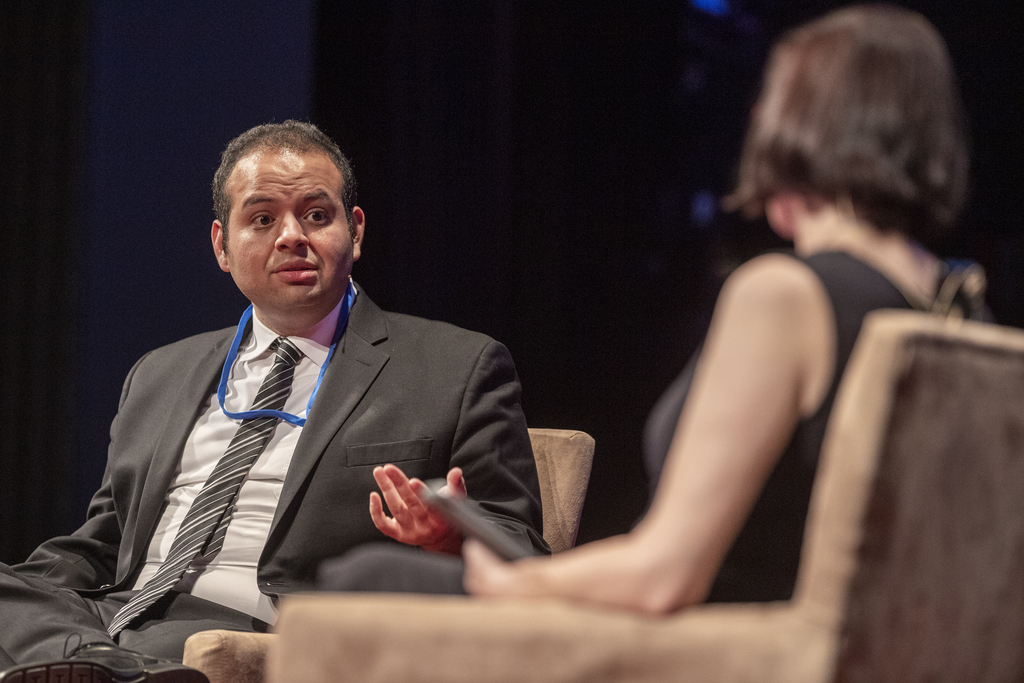Different, Not Broken
Author and journalist Eric Michael Garcia dispels autism misconceptions at University of Delaware event
By Abbey Negin, University of Delaware sophomore and intern for the University of Delaware’s Center for Political Communication
Watch the video. Read the transcript.
NEWARK, Del. – “I want to be able to live freely and move freely, and all autistic people want to live freely and move freely,” said author and journalist Eric Michael Garcia, while discussing how police aren’t equipped to help autistic or mentally ill people having breakdowns. The University of Delaware Center for Political Communication welcomed the journalist and author of “We”re Not Broken: Changing the Autism Conversation? on October 6, 2021.
Garcia joined series director Lindsay Hoffman, Ph.D., on stage at Mitchell Hall Theatre for the third event of the National Agenda “Reflecting America” series. The Washington, D.C.-based political journalist described his experience with autism and reflected on media portrayals of autism and other disabilities.
Garcia has dedicated his writing career to spreading awareness about the reality of autism, normalizing the condition, and confronting the stereotypes, fears, and negative stereotypes. His book, “We”re Not Broken: Changing the Autism Conversation,” presents autism as a difference – not a reason to fear or shun anyone. It suggests that the desire to “fix? autistic children instead of nurturing them only tells them that they”re broken.

Garcia has worked as an editor for the Washington Post and The Hill, and as a reporter for MarketWatch, Roll Call, and National Journal. He has written for even more news outlets, such as the Daily Beast, The Week, Salon, the New Republic, the American Prospect, and Spectrum.
Reflecting on the title of his book, Garcia proposed that society should work more to accept autistic and other neurodivergent people instead of treating them as broken, unable to fit in with everyone else. Not only did Garcia advocate for this, but he has also proven it every day as a successful Washington journalist.
Garcia highlighted that autism changes how people communicate. “When your kid is having a meltdown, when an autistic person is having a meltdown, that’s them communicating. That’s them saying that this sensory process is too much.”
Garcia compared the differences between “neuroatypical? and “neurotypical.” He defined neurotypicals as people “whose brains function in the way that we have often considered normal,” and neuroatypicals as people who “have for too often not been considered normal or whose brain types have often been considered deviations from the norm.” He stressed the importance of neurodiversity, where all neuroatypicals, not just autistic people, are accepted and accommodated.
Garcia rejected the idea of “advocacy journalism,” saying he disliked being called an advocate and preferred to be seen as “a journalist who covers the autism advocacy movement.” His work focuses on the juxtaposition of disability rights and American politics. By defining autism as part of his identity, Garcia has guided the conversation away from the idea that autism needs to be fixed or cured.
While reflecting on negative perceptions of autism, Garcia discussed the history of the theory that vaccines cause autism. In 1998, the medical journal The Lancet published false research by the British physician Andrew Wakefield. Although the U.S. Congress questioned Wakefield in 2000, few people challenged his theory. It took 12 years for The Lancet to retract the study. In the intervening time, the theory gained legitimacy and visibility. Even celebrities, like Jenny McCarthy”who has pushed the idea since 2008’supported the vaccine theory.
Garcia questioned the reasoning behind rejecting vaccines to avoid autism. ?[Anti-vaxxers] are essentially arguing that it is better to be dead from measles than it is to be autistic.”
As the son of Mexican immigrants, with a Democratic mother and Republican father, Garcia learned early on to engage with different opinions. Most importantly, he learned that love and respect for one another is possible even with opposite views. “With my dad, I”ve come to recognize that even if he may think that my job is a bunch of hooey, he recognized that I do hard work and that I come from an honest place,” Garcia said.
Garcia said he recognizes a loyalty and passion for beliefs in others regardless of ideology, from his own dad to people on the Hill. “I respect the people who stood with Trump Day One. I respect that because at least you have a belief. But if you didn’t vote for him and you”re just doing this because you want a job, then you don’t care about anything.” This statement underlined his belief in open communication, and how people can find common ground with each other regardless of their differences.
Garcia encouraged the audience to have conversations with people who don’t share the same views. “It’s important for you guys to get outside the community and get outside the university bubble and talk with people who maybe aren’t the same as you, if not to come to an agreement but at least understand that we live in this country together. We”re kind of doomed if we don’t live together.”
About National Agenda
The National Agenda Speaker Series continues throughout the semester with guests such as Parkland survivor David Hogg, Delaware State Senator Sarah McBride, and artist and author Nikkolas Smith. For information and to register, visit cpc.udel.edu/national-agenda/2021.
Lindsay Hoffman, Ph.D., an associate professor of communication and political science at UD, directs the series. This year’s theme, “Reflecting America,” examines how this historic era of political divides, social movements, and economic upheavals”fueled by the pandemic and politics”is redefining America. National Agenda is free and open to the public. It is made possible with support from the University of Delaware’s Office of the Provost and the College of Arts and Sciences.
